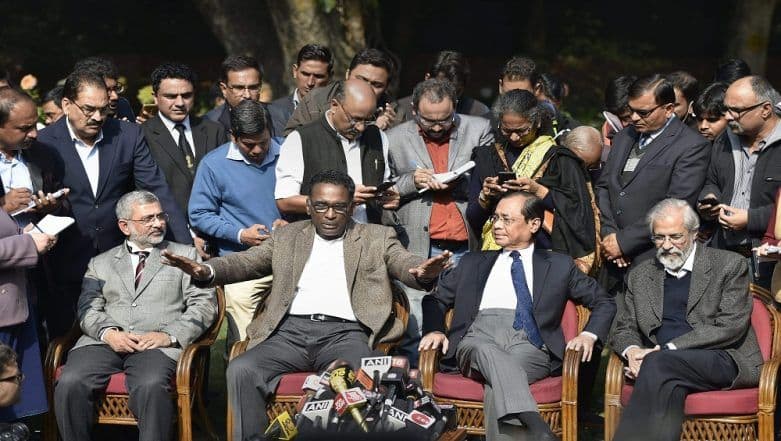Rift in Judiciary: Meet The Four Supreme Court Judges Who Dissented Against CJI
Here are the brief profiles for the four SC judges who became the first ever in the history of India to make their dissent public.

In an unprecedented rift within India’s apex judiciary, four among the seniormost judges of the Supreme Court – Justices Jasti Chelameswar, Madan B Lokur, Ranjan Gogoi and Kurien Joseph – addressed the press on Friday to highlight the “institutional crisis” in the functioning of the top court.
Here are the brief profiles of the four SC judges who became the first ever in the history of India to make their dissent public.
Justice Jasti Chelameswar
Justice Chelameswar is the second senior most judge as per the current hierarchy of the apex court. Set to retire on June 22, the 64-year-old had last stoked a major controversy after marking his apprehension over the functioning of the Collegium – the body designated for appointing judges to the Supreme Court and High Courts.
- Justice Chelameswar was the only Supreme Court judge who aggressively pitched for an alternative to the Collegium mode of appointing judges, calling it an “opaque” procedure.
- Since the tenure of former Chief Justice of India Justice T S Thakur, he stopped attending the Collegium meetings for the appointment of judges to the higher judiciary.
- He was the lone judge of the five-member constitutional bench who did not support the striking down of National Judicial Appointments Commission (NJAC) Act, the legislation introduced by the central government in 2015 for amending the rules for the appointment of judges.
- Justice Chelameswar had also stoked a controversy in November last year, after he announced the setting-up of a five-member constitutional bench to hear the proceedings in the medical college bribery case, involving former Chief Justice of Odisha High Court I M Quddussi.
Justice Ranjan Gogoi
Justice Gogoi is next in line to preside over the Supreme Court, with his appointment as CJI due for October 2, 2018, when Justice Deepak Misra would retire.
- Justice Gogoi headed the apex court bench, which last month, ordered the setting-up of 12 special courts to hear cases pending against the lawmakers. The courts will begin operation from March 1.
- In the matter pertaining to the publication of National Register of Citizens in Assam, Justice Gogoi had exhibited a firm stand, ordering the NRC to publish the roll by December 31 last year. He also ordered the Sarbananada Sonowal-led state government to prevent “intervention” in the functioning of the NRC.
- In 2016, the Justice Gogoi-led bench had issued contempt notice to former SC judge Markandey Katju for his Facebook posts which used scandalous language against the top judiciary. The case was closed after Katju unconditionally apologised before the bench.
Justice Madan Bhimarao Lokur
Justice Madan B Lokur, set to retire on December 30, is heading the bench hearing a bunch crucial cases, including: alleged extrajudicial killings in einsurgency-hit Manipur, prison reforms, child marriage, air pollution in Delhi and preservation of Taj Mahal among others.
- The bench led by Justice Lokur passed a landmark judgement last year while criminalising sex with wife who is minor. As per the order, sex with wife below the age of 18 would be considered as an act of rape.
- The Justice Lokur-led bench was also responsible for temporarily uplifting the ban on the sale of firecrackers in Delhi-NCR ahead of Diwali. The order, however, was later overturned.
- Justice Lokur headed the e-committee for the digitisation of the courtroom between 2012 to 2016, when he was replaced by the then CJI T S Thakur.
Justice Kurien Joseph
- Justice Joseph was part of the five-member constitutional bench which delivered the historic verdict outlawing the practice of instant triple talaq, by a 3:2 verdict.
- Justice Joseph, along Justices F Nariman and U U Lalit, had authored the majority verdict which instantly banned the controversial divorce practice, whereas, the minority verdict written by the then CJI J S Khehar and Justice Abdul Nazeer had opposed putting a blanket ban.
- The 64-year-old also stoked a controversy in April 2015, after he opposed the decision of the then CJI H L Dattu to call the Chief Justice's conference on Good Friday, an auspicious day for Christians.
- His tenure as the Supreme Court judge is set to conclude on November 29, 2018.
In the aftermath of the four SC judges going public with their dissent, the two top association of lawyers - the Supreme Court Bar Association and the Bar Council of India - switched into action, appealing the CJI to take appropriate steps to resolve the matter.
On Monday, Attoreny General KK Venugopal Iyer claimed the rift in judiciary ceases to exist, stating that the matter has been "resolved". Commenting upon the whole situation that unfolded since Friday, the AG said it was a "storm in a tea cup".
(The above story first appeared on LatestLY on Jan 15, 2018 02:42 PM IST. For more news and updates on politics, world, sports, entertainment and lifestyle, log on to our website latestly.com).



